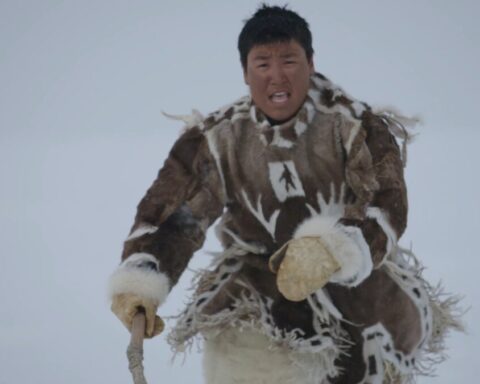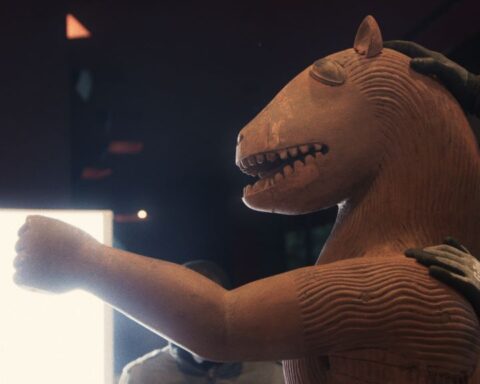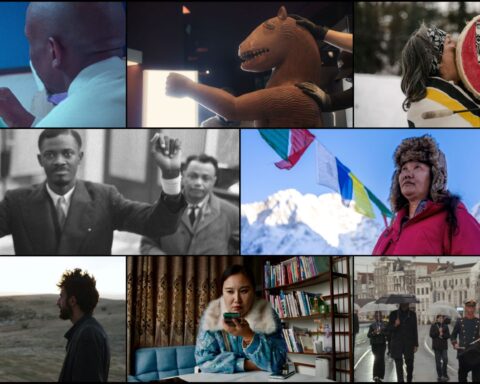Perfume War tells an inspiring tale of friends in wartime. This documentary by Michael Melski chronicles the story of two friends, Barb Stegemann and Trevor Greene, who inspired one another to change the world through small acts of bravery. Perfume War looks at the arc of their relationship that began in their university days and took a dramatic turn when Trevor enlisted to serve in Afghanistan. In a gripping account, Perfume War recounts an attack that left Greene seriously wounded after receiving a Taliban ax to the head. Stegemann explains how seeing her friend cling to life inspired her to make a positive impact in the world and she turned her attention to Afghanistan to continue Greene’s mission to better the lives of those living under the threat of the Taliban.
Melski’s film shows how this brainwave blossomed into a lucrative perfume line in which Stegemann enlisted Afghan farmers to use their crops as essential oils for perfume, rather than opium. Perfume War takes audiences through Stegemann’s journey from Dragon’s Den success story to fragrance-world game-changer with the 7 Virtues line and its philosophy of retail activism in which consumers better the lives of farmers and workers by making socially-conscious purchases. At the same time, the film reveals Greene’s own mission to rehabilitate himself and return to the good fight.
Melski recently chatted with POV to discuss the inspiring Perfume War and the noble acts that ordinary citizens can do to make the world a better place.
POV: Patrick Mullen
MM: Michael Melski
POV: Perfume War has such an interesting story given the two complementary narratives with Barb and Trevor. Whose story did you first encounter?
MM: I actually went to King’s [College] with both of them, so I encountered them both almost simultaneously. We stayed in as much touch as you can—social media lets us stay more connected, so I was aware of what they were doing and they were aware of what I was doing. We were all affected by what happened to Trevor and they both approached me about doing the documentary on their story.
Barb had been approached by other documentarians, but she didn’t feel comfortable with them. The fullness of scope, in terms of how Trevor’s journey was a part of Barb’s journey, wasn’t part of their pitches. I felt, knowing them both, that this was an epic platonic love story about personal and global transformation.
POV: The sense of a love story really runs throughout the film. You’ve worked in a variety of genres: comedy, thriller, shorts. Was there ever a question of taking this story from a dramatic angle?
MM: I love a good documentary in its pure form as a document where the filmmaker just allows the characters to speak. Barb and Trevor are such inspirational people, so I felt that putting the images and their voices in the film would be more impactful than if I put a treatment to it. That said, their story has some inherent dramatic arcs. The hardest thing was that it’s not a linear story. A traditional narrative structure, or single pov, wouldn’t be the right fit for this film. The two intertwining narratives felt right emotionally. The combined story helps with the impact on audiences, too, both male and female.
POV: I think they really play off one another well too. If you only had one voice without the other, you’d really lose something.
MM: Exactly. With Barb being inspired by Trevor and Trevor being inspired by Barb, that engine of inspiration propelled the story and seems to be what people respond to.
POV: The quotes from Marcus Aurelius really drive the film too. Barb talks about his philosophy as a driving force in her writing, but what motivated you to frame the film within his words?
MM: I think it goes back to King’s. There’s an ancient wisdom in Aurelius that has been forgotten in the hustle-bustle of the modern world. He truly was an enlightened philosopher. His Meditations teaches people how to achieve virtue in the midst of conflict. It feels like our world today is at a similar crossroads. People have a lot of despair. Hope is hard to come by. Trevor and Barb both studied philosophy, so these quotes not only provide a natural guide but they’re a natural call of action for the audience. It’s nice to connect ancient wisdom with contemporary wisdom.
POV: We don’t see too many contemporary accounts of Canadians at war—they’re often older, historical stories. Why do you think that is and how have audiences reacted?
MM: It’s been crazy. People come up to Barb, Trevor, and me after screenings to say that the film has inspired them to make changes in their lives. You always start out as a filmmaker thinking you’re going to tell stories that provoke change and, very quickly, the entertainment world beats you down and you start to think, “I’ll just be happy to survive this ordeal and tell stories.” It struck all of us by surprise, partly because we had our noses to the grindstone, but editing all this material together—it’s not that any of us lost sight of what the emotional impact would be—I felt like we were on to something. It made my editor cry several times and he’s not the kind of guy who usually cries. Seeing audiences affected, not just in Canada but also in the US where they aren’t as aware of Barb and Trevor, makes it feel like we’ve crossed some borders already.
In terms of your question about the military, war in documentaries is too often portrayed as sexy. In staying true to the characters, I didn’t want to depict war as combat porn or make fighting look dynamic. I certainly had to include some footage of the actions leading up to the assault on Trevor, but it feels like an outmoded approach to telling a war story.
POV: I think it makes it hit closer to home, too, when you get a look at one person in the field. Also, late in the film, we see a title card that says that a Canadian travel ban prevented production from travelling to Afghanistan. Can you elaborate on the ban and its impact on production?
MM: If you remember that Stephen Harper placed the ban on any travel to and from Afghanistan—
POV: Right.
MM: It was fairly reactionary. I was actually looking forward to going there and bringing that part of the country [the farmers’ perspectives] into the film. It was a question of waiting and sitting on the story, which would have been at least a year, and a matter of having to persuade Abdullah to get us footage from his orchards. There are legal reasons that I can’t speak too much to this, but the Taliban were very adamant that no footage depicting farmers living sustainable lives, growing essential oils, would be allowed to leave the region.
POV: Oh, wow. Really?
MM: I’d love to, but I can’t speak because it’s actually a case of endangerment of lives.
POV: Yes, I can appreciate that the famers would be at risk.
MM: Ya, and it became one of those questions where you ask what the price of it is. If people get hurt in the process of telling a story about them, does that not defeat the purpose of telling the story? It was complicated and quite challenging to bring Abdullah to life using his emails. I had to call upon my Ken Burns collection! But Abdullah, as it turns out from the post-screening chats, is one of the audience favourites. I mainly work in narrative fiction and it’s not like you can invent something here to get yourself out of a jam. You have to work with what you have and the capabilities you have to get it.
POV: For Barb and her journey, she’s such an inspiring character and shrewd businessperson. In addition to being a great subject, it seems like Barb was a real asset to the production of perfume war?
MM: When they approached me, I said the parameters were that I had complete creative license to tell the story and I had final cut. I said, “I will be truthful to your stories, but I will also have the final edit.” They respected that. It’s always a fine line in a documentary when you’re telling a story about a social enterprise. I looked at films like Art & Copy and I Am Not Your Guru, Joe Berlinger’s story about Tony Robbins. I never felt that this had to be a takedown of two amazing people, but actually a fleshing out of those amazing people while staying clear of, say, beauty shots of perfume. I wanted a story of people and the lives they’re affecting.
POV: My understanding is that you are self-distributing Perfume War with the support of Telefilm Canada. What have been some of the challenges and rewards in the doc’s journey?
MM: It’s been a slow burn. We premiered at the Atlantic Film Festival Award and won best feature doc and then won the audience choice award at Victoria. We’ve had some success down south and other festivals around the world are reaching out to us too. In Canada, it’s a very tough business for any theatrical film and it’s rare for a doc to get a theatrical release at all, so we’re grateful to Telefilm and Brad Pelman at Fremantle, our international sales agent, for really making this happen. They believe that the film needs to be seen. Self-distributed, but it helps when you have two powerful entities that believe in the project.
POV: It’s funny when you see the important of getting people out there any, say, buying a ticket for the film, you realise how much Barb’s philosophy of retail activism extends to other topics.
MM: [Laughs.] Exactly! It does come down to small choices. We’re not professed to take on the Fate of the Furious on Easter weekend, but like Abdullah says, small change leads to big impact.
Perfume War opens April 14 at select Cineplex locations in Toronto, Ottawa, Halifax, Calgary and Vancouver.










